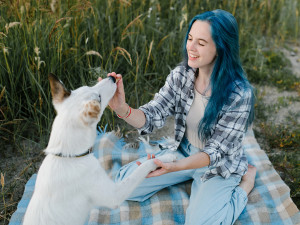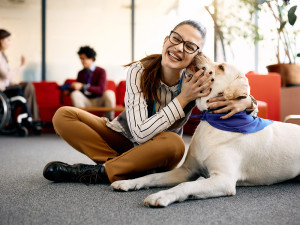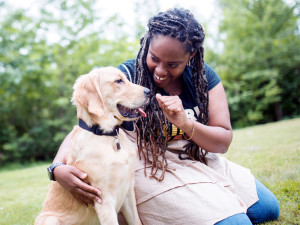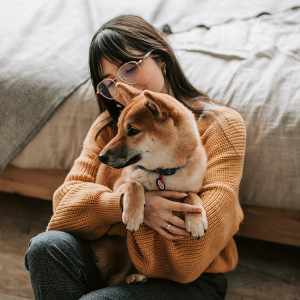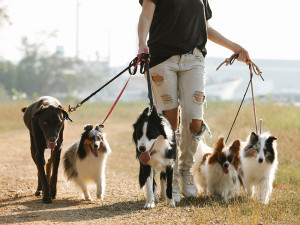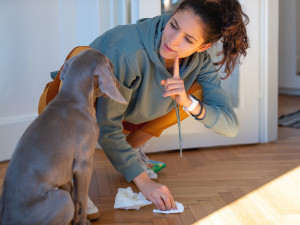Is Your Dog Tricky to Train? Here’s Why You Shouldn’t Feel Guilty
It’s important to remember that dogs are individuals, so training isn’t one-size-fits-all
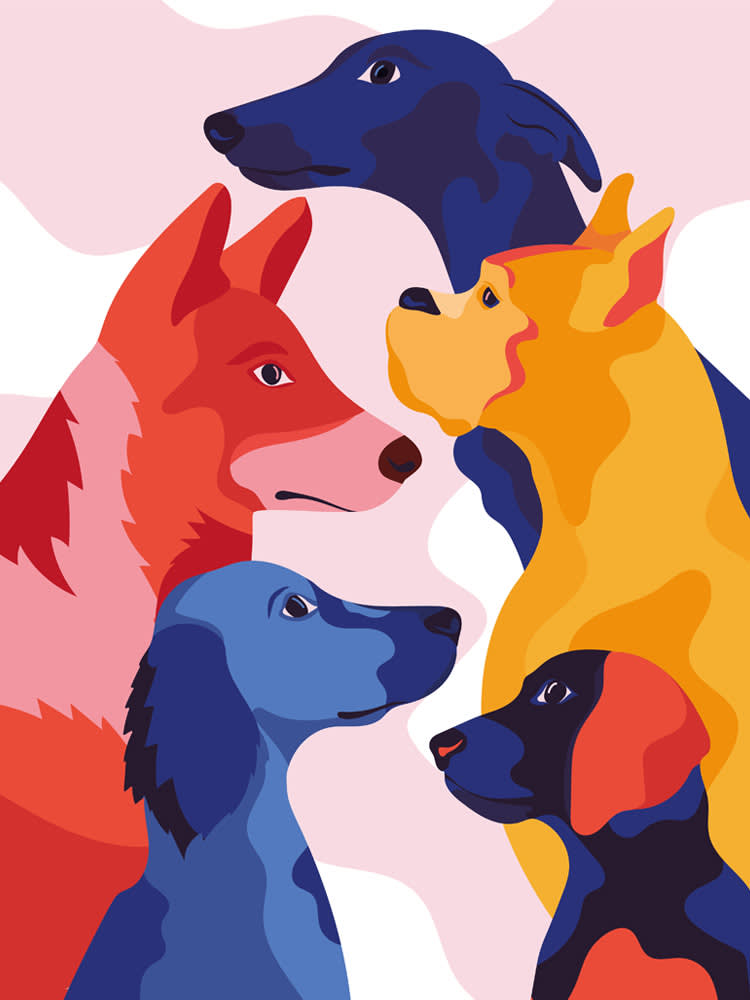
Share Article
Helen’s dog, Benny, was super well behaved, an all-around ambassador to his species, and as every high-achieving student can identify with, “a pleasure to have in class”. Benny was the exemplary kind of dog who chose to rest his head gently on the one child with developmental disabilities when he visited classrooms, could be trusted to keep his paws and mouth to himself at a party where food had dropped on the floor or low tables, never barked and slept through thunderstorms. He was, in short, quite unusual.
As the instructor of his intermediate training class and of his tricks and games class, I could see that he was as easy a dog to train as any I have ever met, and he probably would have been a delightful companion, largely devoid of bad habits, without any training. He was one of those rare dogs who can make any trainer look good. Helen didn’t understand that Benny was a bit of an outlier until after he died and she adopted her next dog, Miro.
Miro was, by no means, as difficult as dogs go, but he was quite typical and different from Benny. He was a little tricky to potty train but not overly challenging. He chewed, barked, jumped on people, was mouthy, counter-surfed, searched bags for snacks and pulled on a lead enough to make walking him unpleasant. As much as Helen might have wanted to look inward and say: “OK, so, what am I doing wrong?”, the truth, in this case, was nothing. They can definitely respond to training, but all dogs are innately individual.
Dogs are who they are
I wish everyone understood the individuality of dogs and what that means when it comes to their behaviour. Helen learnt that lesson, but not every dog parent even knows they need to. Even unlimited love and training won’t turn a dog with impulse-control challenges, high-arousal issues or fearfulness into a dog who is a good match to be a service dog.�
Too many people are being told that if they would just train their dog better or reinforce them more, they could turn their dog into whatever sort of dog they desire, but I don’t believe that. This line of reasoning does a lot of harm to people; it makes them feel like failures, which is unfair. A dog parent might have trained their pup beautifully, but each dog responds differently to the same amount of and approach to training.
Thankfully, many trainers understand the importance of each dog’s individuality. For every dog who professional trainers can trust off leash in any setting, there is a dog who can only be given such freedom in limited situations. Not all dogs are capable of being demo dogs for training classes. But, when many trainers are referencing the dogs who taught them the most, they usually bring up their most challenging dog, not the straight-A student.
Patience – and understanding – is key
Years ago, I had a dog who didn’t learn very fast. It would frequently take me weeks, or even months, to teach him something that I would teach my clients’ dogs in one or two sessions. I knew that his speed of acquiring new skills was not an indictment of my training skills; I could clearly train some dogs with much less effort. It was just a fact that my dog was not a quick study, but someone who didn’t know that might have criticised me if they’d seen our slow progress.
Your pup is special simply because they’re your baby. Remember, their personality, and their response to training, is just as unique. Not every dog is capable of handling large parties, off lead walks in the woods or children trying to hug them, even with lots of training. Some struggle to control their mouths, to keep their barking in check or to keep all four paws on the floor when greeting anyone. Yes, of course training can lead to improvement in all these behaviours, but some dogs take to the training like naturals and others don’t.
Accept your pup for who they are
Sure, it’s a good goal to try to expand the variety of situations they can handle with training and behavioural modification, but you wouldn’t want to change who they are at their core – and it doesn’t make sense to try. The variation among dogs (whether the main cause is genetic, a result of earlier life experiences or the usual mix of these two factors) can’t be undone by training. Forcing your pup to exist in an environment that makes them uncomfortable, or that they can’t handle, won’t do either of you any good.
No matter if you have a dog like Benny, one like Miro, or a dog with truly serious behavioural issues, it’s important to accept them for who they are, just as we would want anyone to do for us. So, here’s your charge: recognise that who your pup is has a lot to do with who they are when they came into your life. And, whoever that is, is absolutely perfect in every way – before and after training.

Karen B. London, PhD, CAAB, CPDT-KA
Karen B. London, Ph.D., is a Certified Applied Animal Behaviorist and Certified Professional Dog Trainer who specializes in working with dogs with serious behavioral issues, including aggression, and has also trained other animals including cats, birds, snakes, and insects.
Related articles
![Two hands holding a very young tan and white puppy up in front of a lake landscape]()
How to Socialise a Puppy
Everything you need to know to get your new addition off to a good start
![A woman wearing a knit sweater holding a dog close on the floor of her bedroom.]()
Separation Anxiety in Dogs
Train your dog to stay calm when they’re on their own – instead of sad-singing “All By Myself” until you come home.
![Dog barking]()
How to Stop Your Dog From Barking
The top five reasons dogs bark – and how to help them to relax
![A woman walking 5 dogs on leashes outside.]()
Breed Does Not Equal Behaviour
A study found that a dog’s breed accounts for less than 10 percent of their behaviour
![kneeling woman with braids training her golden retriever]()
How to Find the Right Trainer, No Matter What Your Dog’s Been Through
With so many dog trainers out there that it can be hard to know who you can actually trust (especially if your dog has trust issues of their own), here’s where to start…
![A woman cleaning up pee on the wood floors inside while disciplining a grey puppy with a raised finger of disapproval]()
10 Dog Training Habits You Should Drop Right Now
Training a dog can seem pretty intuitive – until it’s not

